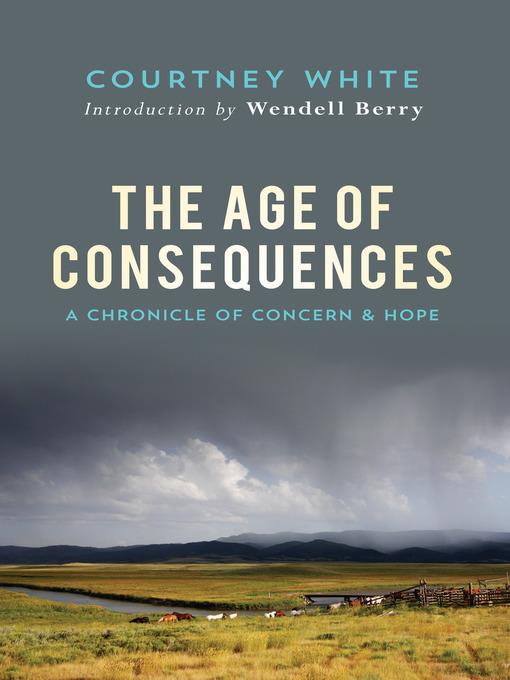
The Age of Consequences
A Chronicle of Concern and Hope
کتاب های مرتبط
- اطلاعات
- نقد و بررسی
- دیدگاه کاربران
نقد و بررسی

November 24, 2014
Echoing the official United Nations report on global climate change released in March 2014, White, an environmental activist and cofounder of the nonprofit Quivira Coalition, warns that the planet faces a severe environmental crisis. He argues, using alarming research, that corporate greed has depleted the Earth’s once-abundant resources “at an unsustainable rate,” noting that half the planet’s oil has been burned in less than a century. White laments that American presidents have said all the right things but done nothing, despite UN reports confirming that climate change is largely man-made and that increased greenhouse gas emissions can undermine civilization itself. His sincere, and often humorous, narrative spans America and Europe, covering the recent Deepwater Horizon explosion in the Gulf of Mexico and the threat posed to Venice by rising sea levels. White’s considerable insight emphasizes the need to save “a diminished world” before the point of no return.

November 15, 2014
A series of essays that explore some of the most pressing environmental challenges we face today and optimistically suggest some solutions.Inspired by an urge to explain to his children what has been done-or not done-to the environment and to chronicle his journey as an environmentalist, activist and parent, White (Grass, Soil, Hope: A Journey Through Carbon Country, 2014, etc.) started a blog on Earth Day 2008 titled A Chronicle of the Age of Consequences, from which the essays in the first half of this book are culled. The Age of Consequences, explains the author, is the moment we are living in now, where the unsustainable ways we have depleted our resources have become impossible to ignore. White reflects on the words of renowned environmentalists, poets and philosophers, as well as his own personal experiences and travels-to places like Venice, Italy and Horse Progress Days in the middle of Ohio Amish farm country-to paint a simple but compelling case for why we should be concerned. By admitting his own inability to constantly align his decisions with his values, White strikes a refreshing tone that will resonate with readers turned off by the superior or condescending attitudes of some environmentalist writers. "We ought to walk," he writes of his mornings shuffling two young kids off to school, ."..but for reasons that are not entirely clear to me, we don't." In the second half of the book, White shares stories of unconventional, progressive ranchers and farmers across the country to suggest new ways of approaching conservation. Throughout, he balances abstract questions and ideas with tangible life experiences. After describing the overwhelming "cornucopia" he was presented with at a natural foods store, he was reminded of a quote from poet Ogden Nash: "Progress was good for awhile...but then it went on and on." Though White presents no earth-shattering revelations (or solutions), readers will be engaged by his frank and thoughtful discussion of our modern environment.
COPYRIGHT(2014) Kirkus Reviews, ALL RIGHTS RESERVED.

February 1, 2015
In less than 100 years, we have consumed more than half of the world's known oil reserves. We have reached a time that White (Conservation for a New Generation; Grass, Soil, Hope) describes as the "Age of Consequences"--the end of a figurative fiesta when our collective hangover kicks in, and kicks in hard. In a series of reflections written between 2008 and 2012, White chronicles his personal experience of living in such a time. Although he makes dire observations about our tendency to splurge and to navel-gaze, the author also argues that there is hope for the future. He contends that conservationists, consumers, and producers can reach compromises in their use of resources by embracing the "radical center." As evidence, he relates the stories of ranchers and farmers who improve the land by working it. By its nature, this book presents fears and hopes that are bound to a particular moment in time. Some might question the objectivity of this narrative; however, by revealing his personal journey with climate change, White makes an overwhelming problem more accessible and immediate to a potentially desensitized audience. VERDICT Recommended for readers of popular science, current events, and social and environmental history.--Talea Anderson, College Place, WA
Copyright 2015 Library Journal, LLC Used with permission.

January 1, 2015
Historians tends to categorize the past in terms of ages: the Bronze Age, the Iron Age, the Industrial Age. Armed with enough knowledge to evaluate our past and the ability to anticipate our future, some thinkers may eventually label the current era the Age of Consequences, depending on how that knowledge is applied. Are humans, as a species, destined to drive so many others to extinction? Are political and financial imperatives greater than those defining conservation and restraint? Have we ignored warning signs at our peril, or is there still time and are there still ways to ensure a destiny that provides hope and sustenance? Environmental activist and conservationist White tackles the fallout of decades of heedless actions, business-as-usual attitudes, and entrenched denial through a series of deeply personal essays that cogently examine pertinent issues from both grassroots and global perspectives. With a tone that is predominantly upbeat yet tempered by the intensely personal concerns of a parent, White offers specific examples of beneficial strategies that can mitigate present conditions and secure future successes.(Reprinted with permission of Booklist, copyright 2015, American Library Association.)

























دیدگاه کاربران